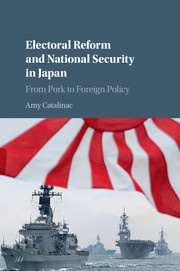Book contents
- Frontmatter
- Dedication
- Contents
- List of Tables
- List of Figures
- Acknowledgments
- 1 Introduction
- 2 Electoral Systems, Electoral Strategies, and National Security
- 3 Measuring Electoral Strategies with Thousands of Candidate Election Manifestos
- 4 Electoral Strategies Shifted from Pork to Policy
- 5 Electoral Strategies Shifted to National Security
- 6 Electoral Strategies of Opposition Focused on Policy
- 7 Impact on Security Policy
- 8 Conclusion
- References
- Index
8 - Conclusion
Published online by Cambridge University Press: 05 February 2016
- Frontmatter
- Dedication
- Contents
- List of Tables
- List of Figures
- Acknowledgments
- 1 Introduction
- 2 Electoral Systems, Electoral Strategies, and National Security
- 3 Measuring Electoral Strategies with Thousands of Candidate Election Manifestos
- 4 Electoral Strategies Shifted from Pork to Policy
- 5 Electoral Strategies Shifted to National Security
- 6 Electoral Strategies of Opposition Focused on Policy
- 7 Impact on Security Policy
- 8 Conclusion
- References
- Index
Summary
A recent article by two prominent international relations theorists suggests that hypothesis-testing is “bad” for international relations (Mearsheimer and Walt 2013). These scholars suggest that “the creation and refinement of theory” is the most important pursuit international relations scholars ought to be engaged in. This book took an empirical puzzle about postwar Japan, namely, why the politicians who governed Japan for more than fifty years paid so little attention to national security before 1997 and so much attention after 1997, used theory from comparative politics to generate testable hypotheses that could explain this puzzle, and collected a wealth of new data to evaluate these hypotheses. It also used other theories to generate eight categories of alternative hypotheses and used other new data to evaluate these. Its conclusion, that the electoral strategies these politicians were forced to adopt under Japan's old electoral system made the costs of paying attention to national security prohibitive, and it was only when their electoral strategies changed after electoral reform in 1994 that the costs were lowered, contributes a new theoretical insight to the sub-field of international relations: that electoral systems influence security policy by influencing the costs of making security policy. This suggests that theory and careful hypothesis-testing need to go hand-in-hand, for it is only by elucidating and carefully testing hypotheses that new theories may be advanced.
The contributions of the book span the sub-fields of international relations and comparative politics, as well as the study of Japanese politics and Japanese security policy. For international relations, the book demonstrates that electoral systems influence security policy by influencing the amount of attention politicians can pay to it and the costs of changing it. Crucially, this influence is exercised independently of the level of concern politicians or their voters might have about national security and independently of any policy preferences or ideological inclinations they might hold. This confirms the findings of a growing body of work in international relations that establishes the impact of domestic political institutions on security policy (e.g. Bueno de Mesquita et al. 1999, 2003; Schultz 1999; Kaarbo and Beasley 2008; Davis 2008; Hymans 2011). It also demonstrates that democracies, like autocracies (Weeks 2008), vary in the extent to which people can hold leaders accountable for the provision of national security and other policies.
- Type
- Chapter
- Information
- Electoral Reform and National Security in JapanFrom Pork to Foreign Policy, pp. 209 - 220Publisher: Cambridge University PressPrint publication year: 2016

